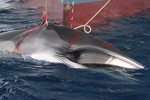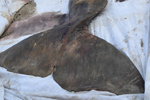Noises from pile-driving, explosives, ship motors and other industrial activities have all been linked to adverse effects on marine wildlife. A new study, funded by the US Navy and published in Proceedings of the Royal Society B, suggests that military sonar may be directly impacting whale behavior.
The idea that sonar might affect the behavior of whales is not new. A number of reports in the past have linked the use of military sonar to mass stranding events of beaked whales and baleen whale species. Yet the hypothesis has remained controversial because although researchers have observed these effects, they have no idea how exposure to sonar could cause whales to strand themselves.
 An adult blue whale (Balaenoptera musculus). Photo by NOAA and in the public domain. |
One of the leading hypotheses is that sonar might disrupt communication between whales, either by interfering with sound waves or damaging their hearing. Yet this theory doesn’t offer a clear biological explanation.
“The strong impact of mid-frequency naval sonar is puzzling because the frequency of…hearing of many toothed whales (Odontoceti) are much higher than mid-frequency sonar,” the researchers write in the paper.
Mass stranding events have been noted since 1874, but the frequency and severity of these events has increased since the introduction of naval sonar in the 1950s. Most studies on mass stranding have looked into the correlations between the timing and location of military exercises and mass-stranding events, but such studies make it difficult to directly infer cause and effect.
To solve this problem, scientists from The Southern California Behavioral Response Study (SOCAL-BRS), looked at the impacts of sonar on the behavior of individual blue whales (Balaenoptera musculus) by placing tags on them to track both their exposure to sonar and their movements.
“The tag technology we use offers a unique glimpse into the underwater behavior of whales that otherwise would not be possible,” said Ari Friedlaender, a research scientist at Duke Marine Laboratory.

A blue whale fluke off the coast of California. Photo courtesy of “Mike” Michael L. Baird under a Creative Commons Attribution 2.0 Generic license.
Brandon Southall, SOCAL-BRS chief scientist, added that “these are the first direct measurements of individual responses for any baleen whale species to these kinds of mid-frequency sonar signals.”
The results of the study lend weight to the hypothesis that sonar does directly alter whale behavior.
 Duke research scientist Ari Friedlaender plants a suction cup tag on the back of a blue whale off the coast of Southern California. Courtesy of Ari Friedlaender, Duke Marine Lab (NMFS Permit 14534). |
“Whales clearly respond in some conditions by modifying diving behavior and temporarily avoiding areas where sounds were produced,” said Goldbogen. “But overall the responses are complex and depend on a number of interacting factors, including whether the whales were feeding deep, shallow or not at all.”
The study took place off the coast of California, in an area with frequent military exercises using sonar. The authors hope that these findings, along with similar results of a related study on Cuvier’s beaked whale, will increase awareness of the effects of sonar on whale behavior.
“These findings help us understand risks to these animals from human sound and inform timely conservation and management decisions,” said Southall.
Citation:
- “Blue whales respond to simulated mid-frequency military sonar,” Jeremy Goldbogen, Brandon Southall, et al. Proceedings of the Royal Society B, July 3, 2013. DOI -10.1098/rspb.2013.0657
Related articles
Sonar used by oil company caused mass whale stranding in Madagascar
(09/25/2013) An oil company’s use of a high-frequency mapping sonar system was responsible for a mass whale stranding in northwest Madagascar in 2008, finds a new report.
Australia aims to end Japan’s whaling

(06/27/2013) Australia is hoping to put a permanent end to Japan’s annual slaughter of hundreds of whales in the Southern Ocean, in a landmark legal challenge that begins this week. Australia, a vocal opponent of Japan’s annual “scientific” hunts in the Antarctic, says it is confident that the international court of justice (ICJ) in The Hague will outlaw the hunts at the end of a highly anticipated case that is due to start on Wednesday.
Whales teach each other new feeding behavior

(05/29/2013) Humpback whales (Megaptera novaeangliae), popularly known for their majestic and alluring underwater mating songs and acrobatic breaches, have shown that they can adapt to changing prey variability by passing on new hunting techniques to each other. According to new findings in the journal Science, a team of researchers have revealed the cultural spread of new hunting techniques through a population of humpback whales over the span of 27 years.
Are seagulls killing whales in Patagonia?

(05/08/2013) It sounds ludicrous, but it could just be true: scientists say seagulls may be responsible for hundreds of southern right whale moralities off the Argentine coastline. Since 2003, scientists have documented the deaths of 605 southern right whales (Eubalaena australis) near Península Valdés which the whales use as a nursery. Notably, 88 percent of these were newborn calves. The death rate is so high that researchers now fear for the whales’ long-term survival.
Munching on marine plastic kills sperm whale

(05/07/2013) What do children’s toys, balloons, mattresses and plastic bags have in common? They can, along with more non-biodegradable pollutants, be found in the belly of a sperm whale, the topic of a new study in the Marine Pollution Bulletin. The same whale that swallowed Jonah from the Bible, Geppetto from Collodi’s Pinocchio, and the crew of the Pequod from Melville’s Moby-Dick is now swallowing trash from the Spanish-Mediterranean coast, and in the Strait of Gibraltar.
Japan killed record low number of whales
(04/05/2013) Japan blamed environmental activists for a “record low” take during this year’s whaling season in the Southern Ocean, reports Kyodo News.
Save Lolita: new film urges release of captive killer whale

(01/22/2013) Through his new 90-second PSA, Save Lolita, filmmaker Daniel Azarian wanted to connect people to the plight of Lolita on a deeply human level; the only problem: Lolita is an orca, also known as a killer whale. But the stark, moving PSA succeeds, given the sociability of an individual—human or orca—who was stolen from her family and held in captivity for the past 42 years at Miami’s Seaquarium.
Whale only known from bones washes up on beach in New Zealand

(11/05/2012) In 2010, a whale mother and male calf were found dead on Opape Beach in New Zealand. Although clearly in the beaked whale family—the most mysterious marine mammal family—scientists thought the pair were relatively well-known Gray’s beaked whales (Mesoplodon grayi). That is until DNA findings told a shocking story: the mother and calf were actually spade-toothed beaked whales (Mesoplodon traversii), a species no one had ever seen before as anything more than a pile of bones.
Humpback whales delaying migration due to Antarctic changes
(07/30/2012) Humpback whales in the Antarctic are delaying their migration to feed on krill that are staying later due to reduced extent of sea ice, a possible consequence of climate change, reports a study published in the journal Endangered Species Research.
Video: All white killer whale spotted in Russia
(04/27/2012) Scientists in Russia have captured the first-known video footage of an all-white killer whale.
Beyond Bigfoot: the science of cryptozoology

(03/26/2012) Anyone who doubts cryptozoology, which in Greek means the “study of hidden animals,” should remember the many lessons of the past 110 years: the mountain gorilla (discovered in 1902), the colossal squid (discovered in 1925, but a full specimen not caught until 1981), and the saola (discovered in 1992) to name a few. Every year, almost 20,000 new species are described by the world’s scientists, and a new book by Dr. Karl Shuker, The Encycloapedia of New and Rediscovered Animals, highlights some of the most incredible and notable new animals uncovered during the past century.
Featured video: scientists capture first footage of Shepherd’s beaked whale
(02/27/2012) Scientists have captured what is believed to be the world’s first footage of the cryptic Shepherd’s beaked whale (Tasmacetus shepherdi), one of a number of beaked whale species about which scientists know almost nothing.
Amazon.com stops selling whale meat
(02/22/2012) Amazon Japan, a subsidiary of Amazon.com, pulled all whale meat products (and possibly dolphin meat) from its site after a new report by the Environmental Investigation Agency (EIA) and the Humane Society International highlighted the issue. Last December the organizations recorded 147 whale products on sale at Amazon Japan despite an international whaling moratorium since 1986. Japan, along with Iceland and Norway, continues to industrially hunt whales. Japan says their whale hunt is for scientific purposes only, but environmentalists dispute this.